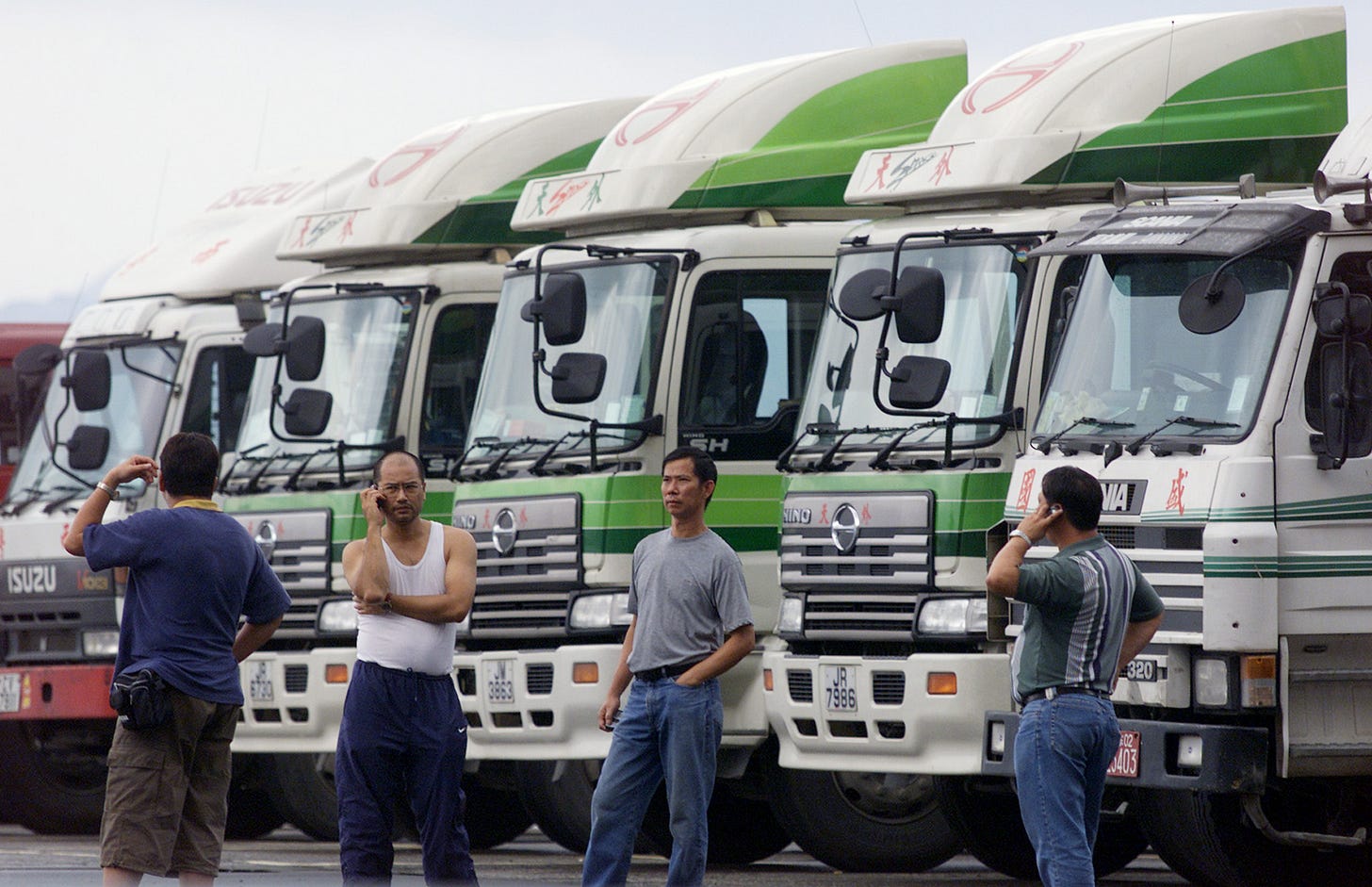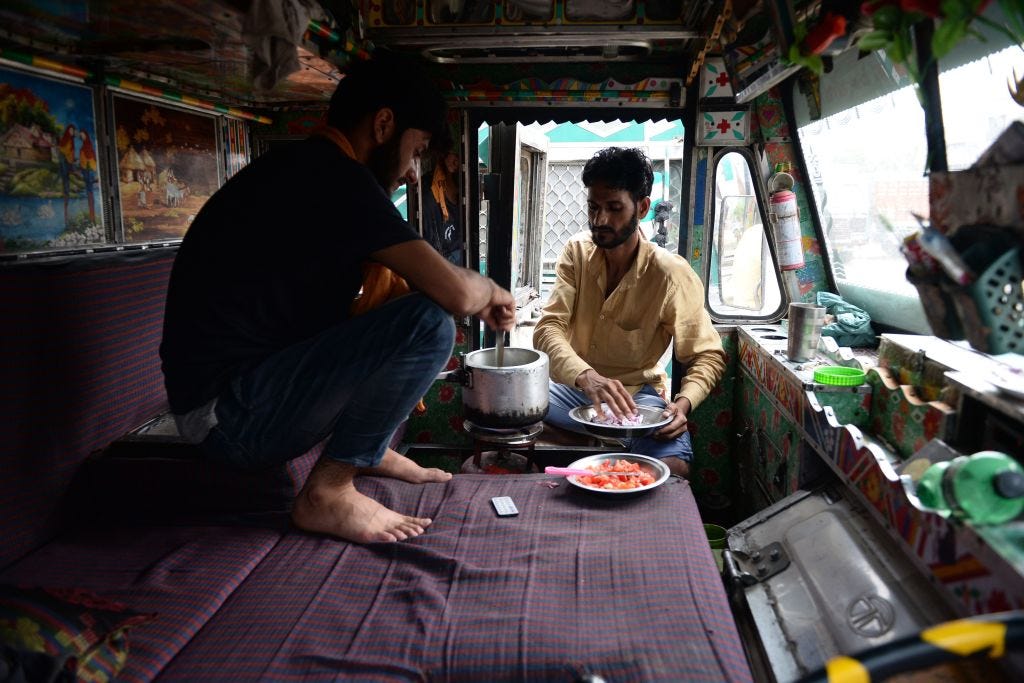The vibe shift will favor truck drivers
Truckers might just become pop culture — and political — icons again
Truck drivers are blockading the streets of Ottawa amid the Freedom Convoy, and people are freaking out. But not David Witwer, a professor at Penn State Harrisburg. Blocking the roads with trucks, he told me this week, is a classic Teamsters tactic — back when striking truck drivers were regarded as a "menacing” force.
However, the Teamsters aren’t championing this particular demonstration of truck drivers — despite the sustained international attention this protest has captured since late January. The Freedom Convoy has not appealed to writers at publications like Jacobin and The New York Times, either. Meanwhile, the political right, whose leaders often challenge pro-worker legislation, has embraced this demonstration.
That the left is distancing itself from this protest against vaccine mandates is not particularly surprising. Such measures are highly politicized in the US: 93% of Democrats support vaccine mandates for large employers, compared to 17% of Republicans. Teamsters expert Witwer summarized the union’s viewpoint in rejecting the Freedom Convoy as such: “This is a strike to benefit the far right. It will not benefit unionized truckers.”
What is surprising is that truck drivers are being used as political objects at all. It’s emblematic of a new era — dare I say, a vibe shift — for the truck drivers. For the past several decades, truck drivers haven’t been represented in the discourse in the same way that coal miners, fast food workers, or teachers are. I’ve always found this bizarre, considering truck driver is the most common job title in many states. However, their myriad labor concerns have been mostly ignored by legislators and mainstream publications (except, of course, for lauded news sources like Modes and Business Insider).
It wasn’t always like this.
Truck drivers used to be pop culture icons. They had massive political sway, thanks to the fearsome Teamsters union. From the 1980s onward, truck drivers fell out of favor as working class heroes. The collapse of unionization in trucking — falling from two million truckers to around 70,000 today — in turn has meant drivers are no longer a unified worker group.
But now, reflecting a slowburn kicked off by COVID supply chain issues, truck drivers are in vogue again as a fearsome political force. It’s just not how any of us expected it.
Why the #FreedomConvoy succeeded and basically every other recent trucker protest has failed
The #FreedomConvoy is the most successful North American trucker protest in decades — no question. The most recent successful strike dates back to 1973-1974, when drivers nationwide, protesting soaring gas prices, snarled supply chains.
Read more: There's a stark reason why America's 1.8 million long-haul truck drivers can't strike
Some say the protest is not representative of truck drivers, because the bulk of its supporters are outside trucking and even outside Canada. Various trucking organizations have echoed that, saying the Freedom Convoy does not represent what most truck drivers think. Industry officials have estimated that 90% of Canadian drivers are vaccinated, tracking the general population.
The Freedom Convoy reflects larger right-wing talking points about vaccination. It’s pushing a political opinion that’s not exclusive to trucking.
And that… is why it has been so successful!

Compare the Freedom Convoy to the intriguingly-named Black Smoke Matters movement from several years ago. In 2018, a safety rule designed to curb how many hours truck drivers are behind the wheel each day went into effect. Many drivers argued that this rule — called the ELD mandate — actually made their jobs more unsafe.
The ELD mandate infuriated drivers. I have received hundreds, and more likely thousands, of emails about the rule. To protest it, a group of truck drivers made a Facebook page called Black Smoke Matters. The plan: Don’t work for one day, April 12, 2019. More than 15,000 drivers joined the group ahead of the protest.
The protest, while well-planned, did not really make a dent. If it did, I probably wouldn’t have had to spend the last few paragraphs explaining it. And you also wouldn’t need an explainer on the ELD mandate!
Compare that to the Freedom Convoy. Even if you’re outside of trucking, you can process the idea of vaccine mandates to drive crossborder shipments. If that’s something you don’t like, you might want to support this group of workers who are pushing against it by sending a tweet, some cash, or even rallying in person. If the public understands your cause, that opens the door for them supporting it.
The idea of an electronic-logging device that tracks your adherence to the Department of Transportation’s hours of service law — sorry, I just fell asleep — is something that is more challenging to communicate to the public. There’s no clear rallying cry around reforming the ELD mandate or hours of service laws in the way that, say, you can support the Fight for 15.
The Freedom Convoy showed to truck drivers that, if they want to capture public attention, they need to talk about things the public understands. As Montreal-based truck driver Rick Blatter told me, this protest was about “freedom” — not a trucking regulation that public doesn’t understand.
Even if you hate the Freedom Convoy, you should care about trucking labor issues
Truck drivers who want to protest now understand how to communicate with politicians, journalists, and the public at large. And it seems like some of us are finally ready to listen to them.
In my years covering the trucking industry, I’ve been consistently baffled as to why more politicians specifically don’t court truck drivers (and journalists, for that matter). There are nearly two million truck drivers in the US. As anyone who has written an article about truckers and received hundreds of emails can tell you, they are incredibly engaged. Hundreds of thousands of them are small business owners. The majority of truck drivers are white, and many are over the age of 60. Following demographic trends, that means this truck drivers are more likely to vote.

It’s a massive win for the right that they’ve aligned themselves with truck drivers. Drivers have been right-leaning for years, but the Freedom Convoy has been an opportunity for the right to profess their solidarity with truck drivers, an otherwise ignored group. I’ll be interested to see if more Republican politicians pledge to solve issues that frustrate drivers, like halting a new law in which those as young as 18 can drive interstate. (This bill was proposed before Biden, but it was his allegedly-pro-labor administration that passed it.)
And a message for those who want increased economic stability for all Americans: Even if you don’t agree with the drivers protesting the vaccine mandate, it’s hypocritical to completely ignore the two million people in that industry.
I’ve spoken to hundreds of truck drivers in North America over the years. One truck driver have told me that he is treated like “an indentured servant,” an opinion that I’ve heard echoed by many. While most workers are protected by minimum wage laws, truck drivers are excluded. Some report that they often have to pay their employers for the pleasure of driving their freight for them.
It wasn’t always like this: Truck drivers’ salaries have decreased by as much as 50% over the past 40-plus years, according to Michael Belzer of Wayne State University. The median pay for a truck driver in the US stands at $47,000 annually, though the job requires being away from home for weeks at a time and 14-hour workdays. Few drivers are unionized, and nearly 40% lack health-insurance coverage (compared to 17% of the rest of workers).
Blatter, the Canadian truck driver, told me the point of the #FreedomConvoy isn’t just vaccine mandates. It’s about how truck drivers have seen worsening treatment amid the pandemic — despite all your #ThankATrucker memes. While pay has largely increased for truck drivers, there’s still a lack of respect. Blatter, who also heads public relations for the Canadian Truckers Associations, said major multinational corporations have relegated waiting truck drivers to portapotties amid COVID concerns, even as temperatures drop in Canada to negative 20. He said some companies banned drivers from their cafeterias, even though they might keep them expecting their load for up to eight hours — unpaid.
“We are delivering essentials and medication, but we have no toilets, no showers, no food,” Blatter told me.
“People have hit a threshold,” Blatter added. “Blue collar workers have taken a big hit and (we) are sick and tired of this.”
Relevant reading
Lighten The Truckers’ Load by truck driver and my friend Gord Magill
American reactions to Canada’s trucker protests shows how much our politics have changed by LA Times columnist Jonah Goldberg
As always…
Send me an email at rpremack@insider.com with your thoughts and feelings. Have a good weekend!






